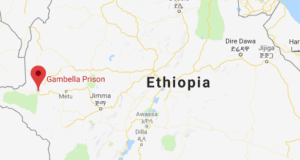
(Photo: Cybergazing)
ESAT News (March 19, 2016)
Hunger stricken people from rural Ethiopia are fleeing to cities in search food to save their lives. Some of the victims who spoke to ESAT’s stringer in Addis Ababa said they had no option but leave their villages to save their lives. The Ethiopian government has so far been playing down the magnitude of the disaster in a face saving but futile attempt to keep an image of a growing country in double digits.
The Prime Minister, Hailemariam Desalegn has finally come out on Thursday calling for the international community to help save the 10 million people who need immediate attention. “It is the responsibility of the international community to intervene before things get out of hand,” he said in a statement that amounts to putting the blame on others. His advisor, Arkebe Oqubay, on the same day told Bloomber Business that his government was able to transform agriculture and feed its people. “The country has achieved food security,” he said in Hong Kong on the day his Prime Minister was making a call to the world to stave off the looming famine in his country.
A father of four who came to Addis from Gojam with fifteen others told our stringer that he has never seen in his life time a calamity so severe. He also said the food aid he was given was not enough to sustain his life so he had to leave his village. His village in Gojam was known for surplus production of food but the drought has hit everywhere this time around, he said.
Three women from North Wollo said they came to Addis in hopes of getting help. They said they left their villages when they run out of food.
Meanwhile a reliable source who said he had travelled to a number of drought stricken areas in south and north Wollo told ESAT that in Alamata, Tigray, Amharic speaking people were not provided with food aid. He said the food is rationed along the ruling party structure that goes down to cells, each comprising of five members. He also said there were people who died after consuming expired maize provided by the government.
The source said people were not only migrating to towns but also dying as a result of hunger. The source who travelled to Sekota, Dana, Alamata, Kobo, Aja, Mihoni, Korem, Maichew and Arbu to name few, said people from these areas have gone to Woldia, a town in Wollo.
 The Ethiopian Satellite Television and Radio (ESAT) No. 1 Ethiopian news media: Esat, Ethiopian news, daily Ethiopian news, ESAT tv, ESAT Radio, Ethiopia
The Ethiopian Satellite Television and Radio (ESAT) No. 1 Ethiopian news media: Esat, Ethiopian news, daily Ethiopian news, ESAT tv, ESAT Radio, Ethiopia





